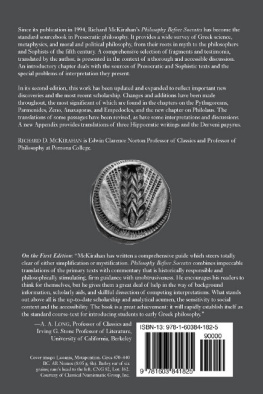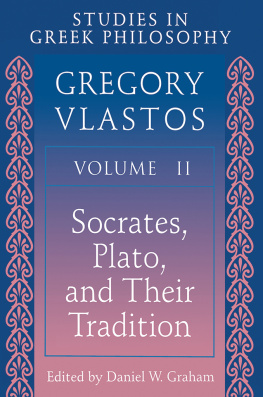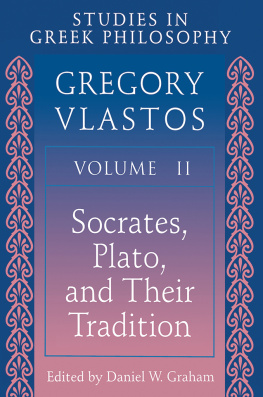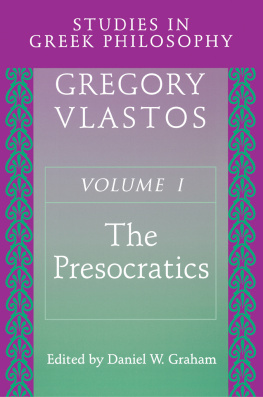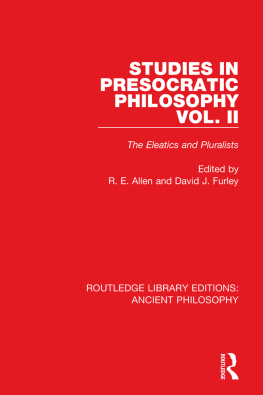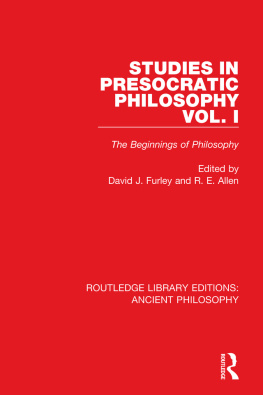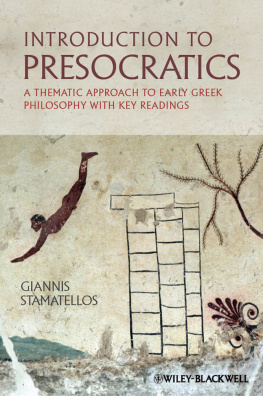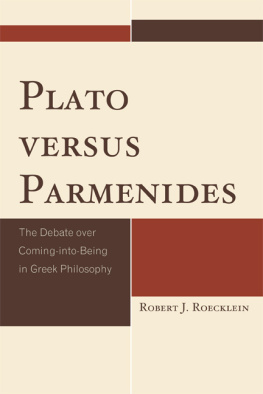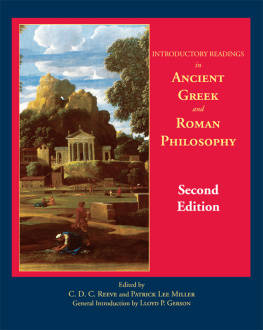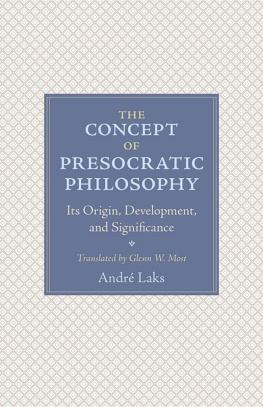Philosophy Before Socrates
Second Edition
Philosophy Before Socrates
Second Edition
An Introduction with Texts and Commentary
Richard D. McKirahan
Hackett Publishing Company, Inc.
Indianapolis/Cambridge
Copyright 2010 by Hackett Publishing Company, Inc.
All rights reserved
Printed in the United States of America
15 14 13 12 11 1 2 3 4 5 6 7
For further information, please address
Hackett Publishing Company, Inc.
P.O. Box 44937
Indianapolis, Indiana 46244-0937
www.hackettpublishing.com
Library of Congress Cataloging-in-Publication Data
McKirahan, Richard D.
Philosophy before Socrates : an introduction with texts and commentary / Richard D. McKirahan2nd ed.
p. cm.
Includes bibliographical references (p.) and indexes.
ISBN 978-1-60384-182-5 (pbk.)ISBN 978-1-60384-183-2 (cloth)
1. Pre-Socratic philosophers. I. Title.
B187.5.M35 2010
182dc22 2009040711
ePub ISBN: 978-1-60384-561-8
for Voula again, as always
Contents
Greek philosophy had been flourishing for over a century when Socrates was born (469 BCE). Socrates thought, as well as that of all later Greek philosophers, was strongly influenced by the work of the early pioneers in the field, both the philosopher-scientists known as Presocratics and the fifth-century Sophists. The theories, arguments, and concepts of the early Greek philosophers are also important and interesting in their own right. And yet this seminal period of philosophical and scientific activity is much less familiar than the work of Socrates, Plato, and Aristotle.
This state of affairs is partly, perhaps principally, due to the nature of the evidence about thinkers before the time of Plato and Aristotle. In contrast with these two great philosophers, many of whose works survive in entirety, not a single work of any of the Presocratic philosophers has been preserved from antiquity to the present, and we have only a few short writings of the Sophists. We are confronted instead with a variety of quotations and paraphrases of their words, summaries of their theories, biographical information (much of it fabricated), in some cases adaptations and extensions of their views, and also parodies and criticisms. These materials come from a wide range of authors who write with different purposes and biases, and whose reliability and philosophical and historical acumen vary enormously.
These circumstances have led some scholars to despair of the possibility of reaching the truth about the early philosophers. The present book, however, is founded on the belief that it is possible to sift through the information and develop interpretations which, though incomplete and not demonstrably correct, have a high degree of internal coherence, mutually reinforce one another, have some historical plausibility, and may be approximations to the original ideas and intentions of the thinkers in question.
Four features of this book deserve comment and explanation. First, since much of the fascination in dealing with early Greek philosophy comes from working out ones own interpretations of the evidence, I have made it a principle to present most, and in many cases all, of the fragments of the philosophers discussed, as well as other important evidence on their thought. Except in the few cases that are noted, the translations are my own. I have aimed to provide translations that are as literal as possible, given the differences between Greek and English. Readers are thus in a position to formulate their own understanding of the early philosophers and to form their own judgments of the interpretations I have put forward.
Second, since our knowledge of these philosophers is largely based on source materials other than their own writings, and since these materials are of unequal value, I have made a point of identifying the source of each passage and (in Chapter 1) of discussing the principal sources and commenting on their strengths and weaknesses. In this way readers can assess the value of the evidence and decide for themselves how to weigh it and how confidently to base an interpretation on it.
Third, during the period covered in this book, knowledge had not yet been divided into the separate categories of philosophy, science, and their subfields. Most of the Presocratic philosophers treated topics which we find more scientific than philosophical, and none of them drew clear lines between his philosophical and his scientific oeuvre. In fact, the earliest Presocratics focused mainly on issues that we assign to the fields of cosmology, meteorology, biology, and matter theory. Thus, in order to be faithful to the thought of the sixth- and fifth-century philosophers, philosophy before Socrates must include scientific issues as well; to omit topics we consider unphilosophical would be to amputate vital portions of their thought without which the remainder would make little sense. Accordingly, I have devoted rather more space to scientific topics than is usual in books of this sort, though in many cases much of the interest the scientific ideas have for us lies in the level of philosophical sophistication on which they are founded.
Fourth, the thinkers treated in this book lived in, and to some extent were the products of, particular times and places. Where possible and appropriate I have said something about their lives and their cultural environment; for these circumstances had important effects on the early Greek philosophers, just as the ideas of these men had important effects on Greek civilization.
My interest in early Greek philosophy and science began with graduate seminars on the Presocratics given at Harvard by the late G. E. L. Own, and my work owes a deep debt to his inspiring teaching and writings, even though I have come to disagree with some of his interpretations. John Murdochs courses on ancient and medieval science which I attended at the same time were models of clear exposition and of history of science at its best. A National Endowment for the Humanities SeminarThe Exact Sciences in Antiquitytaught at Yale by Asger Aaboe opened my eyes to pre-Greek mathematics and astronomy and gave me a wider scientific context in which to situate Greek science. My education in the interpretation of texts in ancient philosophy has been advanced by attending for the past twenty years the meetings of the West Coast Aristotelian Society led by Julius Moravcsik and, for almost as long, the meetings of the Southern California Readers of Ancient Philosophy. I have benefited greatly from the revolutionary work on Greek science done by G. E. R. Lloyd, who has set for me an example of what is possible in this field. I should like to thank him for his friendship and support, which have meant a great deal to me.
I offer my thanks to Professors A. A. Long, John Malcolm, Henry Mendell, Michael Wedin, and Mary Whitlock Blundell for their helpful comments on drafts of the book and for their encouragement. In addition, I am grateful to the students in my courses at Pomona College for their willingness to use the manuscript in lieu of a textbook and for their many valuable suggestions. Finally, I am deeply indebted to Paul Coppock for his generous editorial assistance and to Patricia Curd, who commented on more than one version of the manuscript as I was revising it for publication, and whose suggestions in many cases prompted significant alterations and, I believe, improvements.
Claremont, California
December 1993
Interest in the field of Presocratic studies had grown in the generation before the publication of the first edition of Philosophy Before Socrates in 1994, but in the past sixteen years it has expanded out of all recognition. Two series of international colloquia on specific Presocratic topics have taken place in Europe (beginning in 2000). Two conferences on individual Presocratic thinkers have been held in Latin America. The International Society for Presocratic Studies was founded. Books devoted to the Presocratic thinkers have appeared in standard series such as the
Next page
